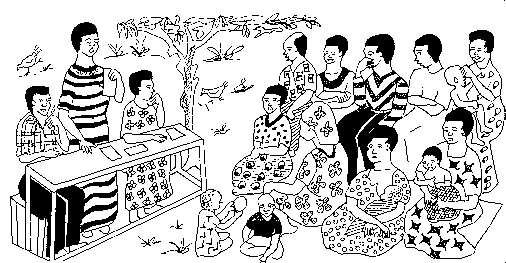Tweet
Translations:
Bahasa Indonesia
Català
中文 / Zhōngwén
English
Español
Filipino/Tagalog
Français
Ελληνικά / Elliniká
Italiano
Português
Română
Српски / Srpski
Türkçe
Other formats:
Other Pages:
Modules
Site Map
Key Words
Contact
Utility Documents
Useful Links
DEVELOPING CAPACITY
Increasing the Strength of Organizations
by Phil Bartle, PhD
Introduction to the Module (Hub)
Documents Included in this Capacity Development Module
- Capacity Development, techniques for increasing organizational strength;
- Measuring the Strengthening of Organizations, an extrapolation;
- Sixteen Elements of Capacity, participants' handout;
- Participants' Forms, for capacity development.
How does an agency become stronger?
You have been given an assignment. Your agency and a small, local NGO have negotiated a development assistance programme. Among the various parts of that agreement, you have been assigned by your agency to assist the smaller organization to develop its capacity. Now you need to develop your intervention strategy and to implement it.
Many of the modules on this site can help you. One, for example is the Management Training module (see, Management Training) and the "Four Basic Questions." This module, "Developing Capacity," identifies sixteen basic elements of capacity, and guides you in planning and carrying out participatory methods of stimulating and guiding your client organization in developing its own capacity.
The methodology here is based upon the "Empowerment Approach" to strengthening communities that are marginalised and facing poverty.
Capacity means "ability." Ability to do what? The ability to carry out the functions and objectives of an organization (or community or society) is determined by its strength. The process of getting stronger (getting more power) is called "empowerment."
One of the important principles in the empowerment methodology is that an organism, whether biological or social, becomes stronger when it engages in some exercise or struggle, and it becomes weaker when it is given things, or things are done for it, that it could get or do for itself. As in community development, your role is to stimulate, guide and encourage the client organization to take action, to help itself, and to become more self reliant.
The training and guidance you provide avoids the "charity approach" (which weakens), and promotes participation in decision making.
In situations where there is considerable dependency (reliance on outside assistance; see, The Dependency Syndrome), the members of the client organization will ask you something like "What do you bring for us?" or, "What will you do for us?" It is important to have a meeting with them to explain that if they are going to become stronger, they will have to do things for themselves; what you bring is the guidance and training, but the resources must be provided by themselves if they are going to become stronger.
A sports-person (athlete) must do her or his own exercises; her or his coach (you) can not do the push ups for that sports-person. (If your agency is also providing financial and other resources to the client organization, you would be more effective if you were to be able to distance yourself from such charity).
The same sixteen elements of strength that can be used to measure changing capacity of an organization, community or society, in this module, are also the focus of your work – your intervention – guiding, stimulating and encouraging the client organization to make itself stronger (see Principles of Empowerment).
The client organization can be a local NGO as mentioned above. It can also be an international NGO, or perhaps a country programme or regional programme of that large NGO. It can be a governmental ministry, department, directorate, agency or programme. It can be a local, district or regional authority and its staff. It can be a private business, micro-business, small enterprise, co-op, credit union, or branch of a large multinational corporation. It can be a UN agency, department or programme. The noun, "organization" in this module can be any of these examples.
In the end, there should be no rigid recipe for you to follow. Instead, learn the principles and techniques that are presented in this web site, observe and analyse the situation, and design your own strategy. Always remember that your overall means and end is "participatory," where you promote full participation in decision making by your clients or beneficiaries.
––»«––
Reporting to the Community:
 |